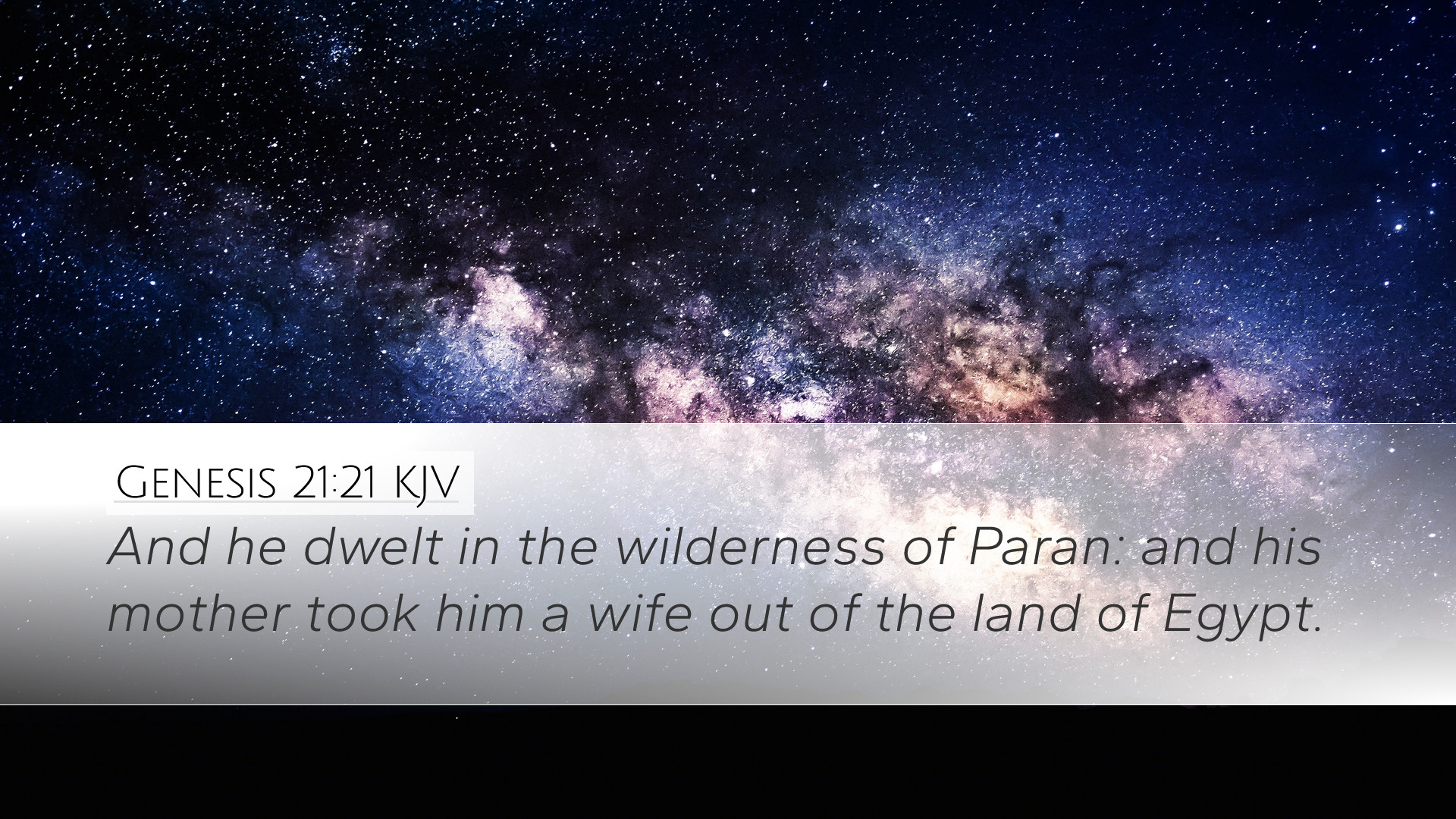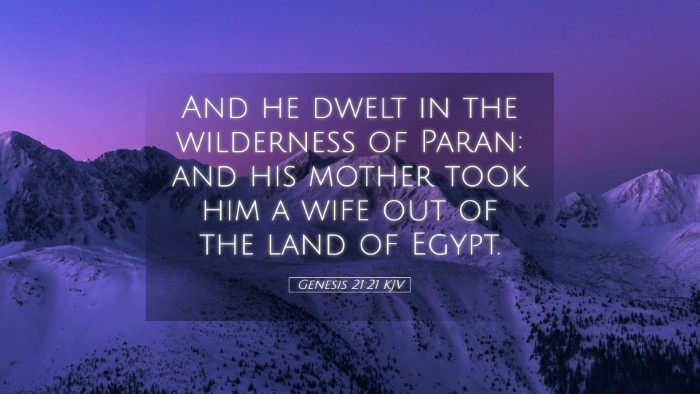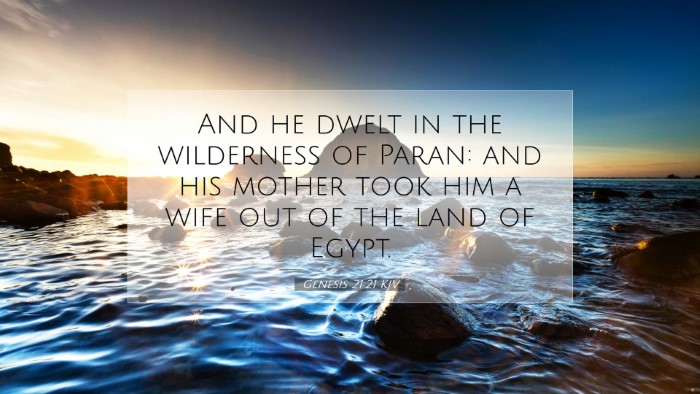Commentary on Genesis 21:21
Genesis 21:21 states, "And he dwelt in the wilderness of Paran: and his mother took him a wife out of the land of Egypt." This verse highlights the subsequent life of Ishmael after his separation from Isaac and offers profound insights into the themes of divine providence, identity, and the shaping of nations.
Contextual Background
This passage follows the birth of Isaac and the subsequent tension between Sarah and Hagar. God had promised Abraham that he would be the father of many nations through Isaac (Genesis 17:19). The expulsion of Hagar and Ishmael signifies a pivotal moment marked by divine intervention yet also by human frailty and familial conflict.
Divine Provision and Favor
In examining Ishmael’s life, it is crucial to recognize the divine promise made to Hagar in Genesis 16:10-12. Despite being cast out, Ishmael is not forsaken by God. Matthew Henry emphasizes that God’s care extends beyond Israel to the children of Abraham. He writes, "The Lord heard the voice of the lad, where he was." This assertion illuminates God's attentive nature and His faithfulness to His promises, even to those who are distant from the covenantal community.
Spiritual Significance of the Wilderness of Paran
The wilderness of Paran is significant as it becomes a formative place for Ishmael. Albert Barnes notes that wildernesses often symbolize periods of trial, shaping, and preparation. In the wilderness, Ishmael finds his identity apart from Isaac, developing into a man who would become a great nation, as God had promised.
Identity Formed in Isolation
The choice of dwelling in the wilderness is not merely geographical but also metaphorical. Adam Clarke emphasizes that wildernesses, while often seen as desolate, serve as crucial spaces for personal transformation. Ishmael's life in Paran represents both a physical journey and a spiritual pilgrimage. The isolation from Isaac allowed Ishmael to develop under God's providence, becoming a skilled hunter and a man associated with a future lineage known for its fierce independence.
The Implications of Marrying from Egypt
The decision of Hagar to find a wife for Ishmael from Egypt raises significant cultural and spiritual questions. Matthew Henry writes about the implications of this marriage: "It was not right for him to take a wife of the Egyptians, as they were not in the covenant of Abraham." This caution suggests the importance of covenant fidelity and the dangers of intermarriage with those outside the covenant community. Ishmael’s choice reflects both the cultural influences of his mother’s homeland and the potential spiritual struggles his descendants would face.
Context of Egyptian Influence
Egypt in the biblical narrative often symbolizes bondage and spiritual emptiness. Hagar's decision holds weight when considering the tensions between Egypt and Israel throughout Scripture. Albert Barnes remarks, "Egypt is often depicted as the epitome of unfaithfulness to God," enhancing the gravity of this union.
Lessons for Modern Readers
The account of Ishmael's life post-separation is rich with lessons applicable to contemporary faith communities. The wilderness experience can be likened to the trials faced by believers today. As Matthew Henry puts forth, "In every condition, God provides for His people." This affirmation provides reassurance to those undergoing spiritual challenges, signaling that divine presence does not leave even in times of separation.
Understanding God's Oversight
For pastors and theologians, the verse invites reflections on God’s oversight in the lives of those marginalized or separated from the community of faith. As seen in God’s care for Ishmael, there lies a promise that God notices those on the fringes of society. Scholars could see in this a robust call to reach out to those who feel abandoned or isolated in their spiritual journeys.
Covenantal Considerations
A critical point of discussion among scholars involves the broader implications of covenant in this narrative. Adam Clarke highlights that although Ishmael was not the promised seed, he still holds a significant place in the biblical genealogy. His life reminds scholars and theologians of God’s complicated relationship with humanity—extending grace and promises even when humans err in fulfilling covenantal obligations.
Conclusion
Genesis 21:21 unveils layers of meaning concerning divine providence, identity, and cultural intersections. Through Ishmael’s journey, we comprehend the wide-reaching effects of God’s plans that transcend human boundaries. The insights drawn from Matthew Henry, Albert Barnes, and Adam Clarke provide foundational understandings for pastoral care, theological discourse, and personal reflection. As believers navigate the complexities of faith, leadership, and community, the story of Ishmael remains relevant, urging us to explore the depths of God’s mercy in our own wilderness experiences.


